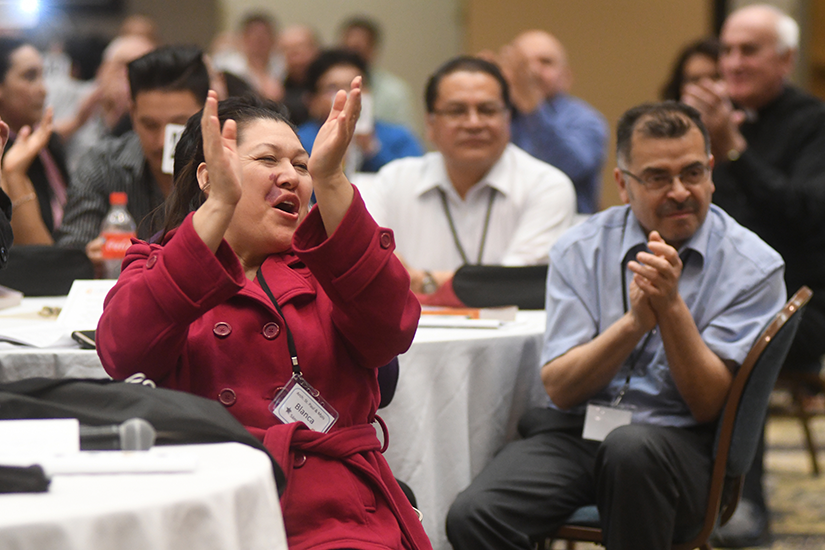SAN ANTONIO — Answer the call to missionary discipleship by
addressing the needs of your Church. Meet young people where they are
and just listen. Improve catechetical resources and prepare future
leaders.
These were some of the strategies discussed by more than
800 delegates representing 18 Catholic dioceses in Texas, Oklahoma and
Arkansas, as they participated in a bilingual three-day Region X
encuentro in San Antonio April 13-15.
Regional meetings are the
latest phase of preparations for the U.S. Catholic Church’s Fifth
National Encuentro, or “V Encuentro,” to be held Sept. 20-23 in
Grapevine, Texas. Previous national encuentros were held in 1972, 1977,
1985 and 2000.
Encuentro is a multiyear process to discern the
needs, aspirations, and faith practices of the 29.7 million Hispanic and
Latino Catholics in the United States. First came parish-level
encuentros, then the diocesan gatherings and now the regional encuentros
are taking place.
The process for the upcoming national encuentro
— inspired by Pope Francis’ 2013 apostolic exhortation, “Evangelii
Gaudium” (“The Joy of the Gospel”) — began in 2014.
“What is the
Holy Spirit calling us to at this moment as a region?” asked Ken
Johnson-Mondragon, the Fifth National Encuentro’s research coordinator,
as he presented to delegates in San Antonio a regional working document
based on diocesan findings. He added that the conversations among
participants while using the document as a discernment tool were most
important.
 Participants in the Region VIII encuentro clapped at an evening talent show April 13 at Arrowwood Resort and Conference Center in Alexandria, Minn. The regional encuentros are part of a multiyear process to discern the needs, aspirations, and faith practices of Hispanic and Latino Catholics in the United States.Photo Credits: Dianne Towalski | The Catholic Spirit
Participants in the Region VIII encuentro clapped at an evening talent show April 13 at Arrowwood Resort and Conference Center in Alexandria, Minn. The regional encuentros are part of a multiyear process to discern the needs, aspirations, and faith practices of Hispanic and Latino Catholics in the United States.Photo Credits: Dianne Towalski | The Catholic SpiritThe delegates worked in about 80 small groups to talk
about challenges, opportunities and successful practices in areas like
evangelization and mission, faith formation and catechesis, youth,
family ministry, immigration and theology. Their recommendations will be
presented before the national encuentro in Grapevine.
According
to the working document, Hispanic Catholics make up 6 million of the
estimated 8.4 million Catholics living in the U.S. Church’s episcopal
Region X. Some dioceses in the region, like Beaumont and Fort Worth,
Texas, Oklahoma City and Tulsa, Okla., and Little Rock, Ark., have seen
their Hispanic population increase more than 100 percent between 2006
and 2016.
The encuentro weekend was full of honest and fruitful
dialogue in both Spanish and English, bilingual presentations, and time
for prayer and song. Over 20 bishops from the region accompanied the
delegates throughout the weekend, with many choosing to participate in
the small working groups’ conversations.
During the discussions,
delegates representing different ministries and cultures, shared some of
the early fruits of “V Encuentro,” which included increased
participation, more resources for Hispanic ministry and a renewed
openness to encountering Jesus in those most vulnerable.
“Parishioners
are going beyond their comfort zones and take time to hear those in
need,” said Lily Morales, Hispanic ministry coordinator for the Dioceses
of Austin, Texas. She described how touched people have been by the
process of going out and encountering people in the peripheries during
their parishes’ encuentros.
Listening and sharing experiences
during the Region X encuentro gave delegates ideas on how to get more
involved and serve their community. Organizers explained that the
multiyear “V Encuentro” process seeks to activate at least 20,000 new
Hispanic Catholic leaders nationwide.
Jackie Flores, a youth
minister at St. Thomas More in Tulsa, said that the “V Encuentro”
process encouraged her to evangelize in her community and family. “The
‘V Encuentro’ helped us to see that we don’t only need to help ourselves
but we need to help others,” she said.
Another priority of “V
Encuentro” is to reach out to U.S.-born Latinos, said Julio Beltran,
coordinator for the Pastoral Juvenil (Hispanic Youth and Youth Ministry)
in the Diocese of Beaumont and chair of the Region 10 Team.
Citing
a study that says that 60 percent of Catholics under age 18 are
Hispanic, Beltran told delegates, “We need to offer spaces where
bicultural and bilingual youth can use their gifts and take leadership
roles.”
There is not “one way” to reach out to the second- or
third-generation Hispanic Catholics, Beltran said, but we can empower
them from their reality. “We cannot have a culture of ‘English only,’
‘Spanish-only’ or ‘We have always done it this way,’” he added.
Parishes
and dioceses must try to provide a sense of community along with
catechetical and leadership formation for both first and second
generation Hispanic Catholics. Beltran echoed the comments of youth
ministers at the regional in San Antonio by saying that young people
yearn for authentic concern for their well-being and their future and
someone willing to accept them as they are and accompany them in their
journey.
“Young Latinos are the present and the future of this
country,” Beltran said. “We should not want to evangelize our youth
because of fear of having an empty Church tomorrow, we should do it
because it’s our baptismal responsibility.”